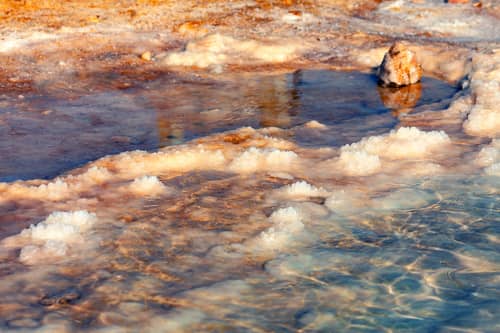Salt is a mineral composed mostly of sodium chloride (NaCl), a chemical belonging to a larger category of salts. The mineral is essential for life in general and contributes to the basic human tastes along with sweet, sour, bitter, and savory or umami.
Is it vegan? Yes, salt is vegan. Of course, there are many chemical compounds containing sodium that are not vegan (e.g. sodium caseinate), but table salt and the various salt substitutes (potassium chloride) are 100% vegan.
What we’ll do here is look at the various reasons salt is considered a vegan food product.
Why Salt Is Considered Vegan
Sodium Is a Mineral
Some vitamins, such as D3, are derived from animal sources, but minerals tend to be mined from the earth.
So, industrially, their production rarely involves animals. Calcium is one exception, but even this mineral tends to be derived from the earth’s crust.
Sodium is an essential mineral and is used for various reasons in food products such as adding flavor and lengthening shelf-life.
Interestingly, salt is one of the only mineral that’s directly consumed by people.1 Salt is used to provide flavor in processed foods, making it one of the most common food additive by weight, second only to sugar in the US.
Table Salt Achieves Its White Color Without Bone Char
Salt crystals are naturally translucent and normally appear white, though impurities can give them a purple or blue tinge.2
Vegans often wonder whether salt qualifies as 100% vegan given that sugar, another food product nearly identical in appearance, often uses bone char to achieve a vibrant white color.
Historically, bone char has been used in sugar refining as a de-ashing and decolorizing agent, particularly in cane sugar as this type of sugar contains more color impurities.3
Bone char has a low decoloration capacity so large quantities have to be used to remove inorganic impurities—namely, sulfates and ions of calcium and magnesium.4
The substances are useful for sugar manufacturers because the removal of these impurities lessens the level of scaling needed later on in during sugar processing.5
Not all sugar manufacturers use bone char, as there are other alternatives such as ion-exchange resins and activated carbon.
To be clear, not all vegans avoid sugar because it contains bone char. Sugar is largely considered a vegan product. But, many vegans opt for organic sugar (which doesn’t use bone char) when buying sugar in bulk.
Sodium chloride, on the other hand, is white (or colorless really) because its electrons are tightly bound to the cations and anions of sodium and chloride, respectively.
Visible light lacks the energy necessary to excite the tightly bound electrons to higher energy levels. Thus, there’s no absorption or emission of light in the visible wavelength, so there’s no color.
The various additives in salt also contribute to it’s white color. Which brings us to the next point.
The Additives in Salt Are Vegan
You’ll find a number of additives in regular table salt. Below are a few ingredients you’ll commonly find in table salt
Anticaking Agents
Common anti-caking agents include:
- Sodium silicoaluminate
- Sodium bicarbonate (baking soda)
- Sodium ferrocyanide
- Potassium ferrocyanide
- Magnesium carbonate
- Calcium carbonate
- Dextrose
These are all vegan. Dextrose is just a sugar product. It’s also added to keep the potassium iodide from being lost due to oxidation.
Potassium Iodide
This is a common form of iodine used in table salt.
So, just keep in mind that you’ll see a few ingredients in processed table salt, and they’re all vegan-friendly.
Is Himalayan Salt Vegan?
Himalayan salt is a type of rock salt (halite). Because it has a unique color (a pink hue), folks often want to know if any animals are used in its production.
Is it vegan? Yes, Himalayan pink salt is 100% vegan. It’s mined from the Punjab region of Pakistan, so it’s derived from the earth, and thus vegan. The pinkish tint is simply due to mineral impurities.
The substance is primarily used as a food additive, and it’s increasingly used as a substitute for regular table salt. I’d imagine, due to the current trend towards natural food. It’s been touted to provide health benefits, but currently, no research exists to back these claims.
It’s also used for other purposes such as in spa treatments and decorative lamps.
Anyway, if you’re vegan you can rest assured Himalayan pink salt is 100% suitable for vegan consumption.
Is Sea Salt Vegan?

Sea salt is a common variant of salt used and tends to be popular among health-conscious crowds. It is also commonly referred to as bay salt and solar salt.6,7
Is it vegan? Yes, sea salt is 100% vegan. Like mined rock salt, sea salt is derived from the earth (not animals). It’s simply salt that’s been produced by the evaporation of seawater. Any brine (water containing high concentrations of sodium) can be used to produce salt, and seawater is the most common source.8
Other sources of brine include lakes such as the Dead Sea, as well as salt water from underground pools.8
If you’re someone who prefers sea salt for whatever reason, keep in mind that brine can also be artificially produced by simply dissolving rock salt in water or by pumping water into drilled wells containing rock salt.
In that vein, salt labeled “sea salt” these days (at least in the US) may not have actually been sourced from the ocean, so long as it meets FDA purity standards.9
Then again, it’s quite arbitrary because all mined rock salts were originally sea salts, to begin with since it all originated from marine sources at some point in the past.
Also, keep in mind that, like Himalayan salt, no scientific evidence supports the claim that sea salt provides any health benefits compared to the more refined sodium chloride table salt.10
Vegans tend to be a health-conscious crowd, and many are drawn to natural food sources. This is unfortunate when it comes to salt, as processed salt is an important source of iodine for vegans and Himalayan and sea salt lack iodine.11
For more on that, you can check out the article, Do Vegans Develop Goiter?
Is Potassium Chloride (Salt Substitute) Vegan?
Potassium chloride is what’s known as a salt substitute. Potassium chloride and other salt substitutes are marketed to reduce the risk of high blood pressure and CVD that’s associated with a chronically high intakes of sodium chloride.12
Is it vegan? Yes, potassium chloride is 100% vegan. It’s made from minerals derived from the earth, thus it’s completely suitable for vegan consumption.13,14
Salt substitutes like potassium chloride are, in fact, salts—they just constitute a different class of salt. They’re simply low-sodium alternatives to traditional table salt.
That sums it up for salt. Thanks for reading.
You may also want to check out the following articles:
- Is Vegetable Oil Vegan?
- Is Tapioca Really Vegan?
- Is Horseradish Vegan? (List of Vegan Variations)
- Is Lard Vegan?
References
- Understanding Food: Principles and Preparation (Page 55). Amy Brown – Wadsworth Cengage Learning – 2011
- Salt. https://en.wikipedia.org/wiki/Salt#Chemistry
- Sugar. https://en.wikipedia.org/wiki/Bone_char#Sugar_refining
- Asadi, Mosen (2006). Beet-Sugar Handbook. Hoboken: John Wiley & Sons. p. 333. ISBN 9780471790983.
- Chou, ed. by Chung Chi (2000). Handbook of sugar refining : a manual for the design and operation of sugar refining facilities. New York, NY [u.a.]: Wiley. pp. 368–369. ISBN 9780471183570.
- Brownrigg, William (1748). The Art of Making Common Salt, as Now Practised in Most Parts of the World. p. 12. https://books.google.com/books?id=H6wAAAAAMAAJ&pg=PA12#v=onepage&q&f=false
- Forbes, R. J. (1955). Studies in Ancient Technology. iii. Brill Archive. p. 169. https://books.google.com/books?id=5JAeAAAAIAAJ&pg=PA169#v=onepage&q&f=false
- “How salt is made – material, used, processing, procedure, industry, machine, Raw Materials” http://www.madehow.com/Volume-2/Salt.html
- Wolke, Robert L. (17 October 2008). What Einstein Told His Cook: Kitchen Science Explained. W. W. Norton & Company. p. 52. ISBN 9780393329421. https://books.google.com/books?id=8Lyrh2JXWuoC&pg=PA52#v=onepage&q&f=false
- “Sea salt vs. Table salt: What’s the difference?” https://www.mayoclinic.org/healthy-lifestyle/nutrition-and-healthy-eating/expert-answers/sea-salt/faq-20058512
- Vegan/Vegetarian. Examine.com https://examine.com/stacks/vegetarian-vegan/
- Scientific Advisory Committee on Nutrition (SACN) Salt and Health.
- Potassium. https://en.wikipedia.org/wiki/Potassium#Commercial_production
- Chloride. https://en.wikipedia.org/wiki/Chloride#Occurrence_in_nature

